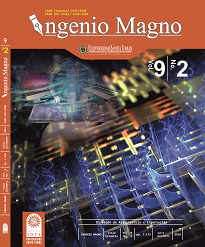Management of the reliability and optimization of energy consumption in air conditioning systems in residential zones
Main Article Content
Abstract
Downloads
Article Details
DECLARATION OF ORGINIALITY OF SUBMITTED ARTICLE
With this document, I/We certify that the article submitted for possible publication in the institutional journal INGENIO MAGNO of the Research Center Alberto Magno CIIAM of the University Santo Tomás, Tunja campus, is entirely of my(our) own writing, and is a product of my(our) direct intellectual contribution to knowledge.
All data and references to completed publications are duly identified with their respective bibliographical entries and in the citations thus highlighted. If any adjustment or correction is needed, I(we) will contact the journal authorities in advance.
Due to that stated above, I(we) declare that the entirety of the submitted material is in accordance with applicable laws regarding intellectual and industrial property, and therefore, I(we) hold myself(ourselves) responsible for any complaint related to it.
If the submitted article is published, I(we) declare that I(we) fully relinquish publishing rights of the article to the University Santo Tomás, Tunja campus. As remuneration for this relinquishment of rights, I(we) declare my(our) agreement to receive two (2) copies of the edition of the journal in which my(our) article appears.
References
Mora, L. (2009). Equipamiento, operatividad y confiabilidad. Ediciones Omega. Colombia.
Duffuaa, R. & Dixón, M. (2002). Sistemas de mantenimiento, planeación y control. Limusa: México
Castellón, R. (2017). Afecciones físicas y ambientales a causa de electrodomésticos. Publicaciones ambiente y desarrollo. Buenos aires: Argentina.
Lancheros-Cuesta, D., Galvis, B. & Pachón, J. (2017). Dispositivo electrónico portable para la medición de la contaminación del aire. Ingenio Magno, 8(1). 8-18.
Méndez, C. (2006). Metodología. Diseño y desarrollodel proceso de investigación. 3ra Edición. Mc Graw Hill. Colombia.
Tamayo, M. (2000). El proceso de la investigación científica. Limusa. México.
Stracuzzi, S. & Pestana, F. (2007). Metodología de la investigación cuantitativa. FEDUPEL. Caracas: Venezuela.

